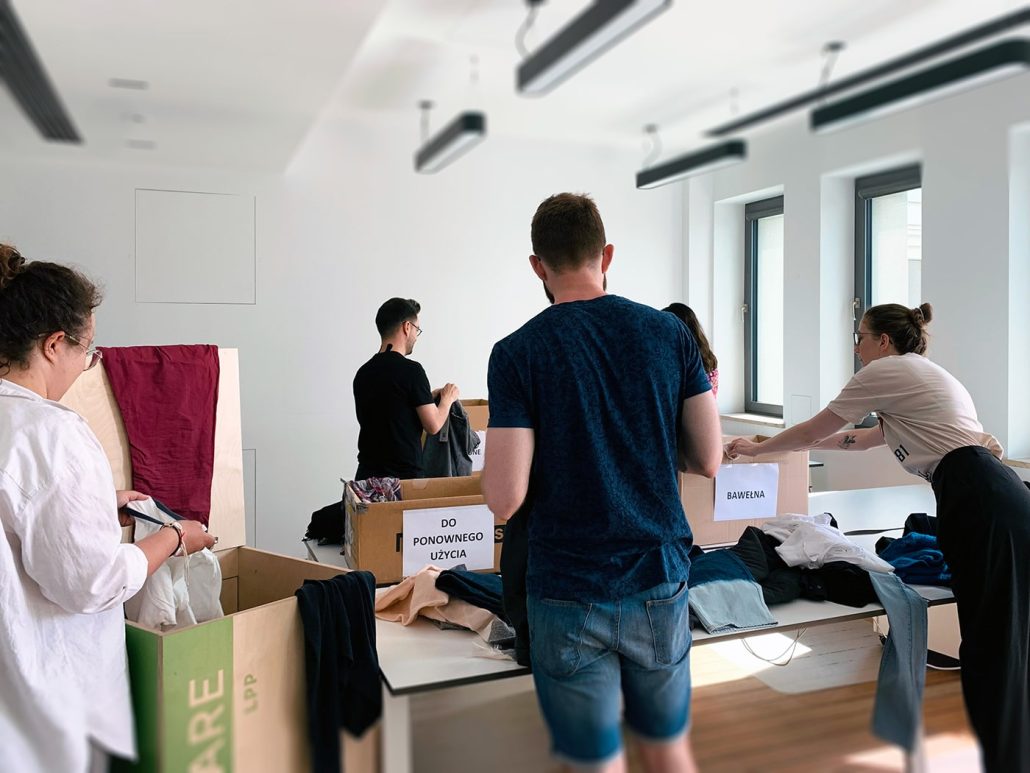LPP as the originator of “Sortownia” [“Sorting Room”] at the Centre for Social Integration in Gdynia
![LPP as the originator of “Sortownia” [“Sorting Room”] at the Centre for Social Integration in Gdynia LPP as the originator of “Sortownia” [“Sorting Room”] at the Centre for Social Integration in Gdynia](https://wwwlpp62711ea95a.blob.core.windows.net/blobwwwlpp62711ea95a/wp-content/uploads/2022/07/20220630-min.jpg)
Work that has educational value and, at the same time, allows one to return to society under the guidance of specialists – at the Centre for Social Integration in Gdynia created and coordinated by St. Brother Albert’s Aid Society (Gdańsk). The pilot of the “Sorting Room” project, with LPP as its originator and class participants as implementers, has just finished.
“Sorting room” is a project combining social and professional activation while supporting pro-environmental activities; it is the outcome of long-term cooperation between the Society and the Polish clothing manufacturer, LPP. Its premise was to create workplaces for persons sorting second-hand clothing collected for several years now in selected LPP brand stores and successively handed over to homeless persons via the Society.
– When we started cooperating with the Society a few years back, we first focused on helping in the form of donating clothes to the organisation’s charges as a result of collection actions carried out in our stores. Last year, following discussions with the Society, we found a new field for cooperation, which at the same time perfectly fits in with one of the main objectives of our foundation, namely counteracting the social exclusion of vulnerable groups through their professional activation. We do hope that the experience gained from the pilot project will provide an excellent basis for further joint activities in the future – emphasises Patrycja Zbytniewska, President of the Management Board of the LPP Foundation.
Participants from the Centre for Social Integration, under the guidance of specialists from the facility, were in charge of preparing for further use or recycling second-hand clothes given away on a daily basis to LPP brand stores. Their task was to skilfully segregate the collected clothing into undamaged and usable clothes and the damaged ones, divided into cotton, polyester, denim or materials of unknown origin sent for further processing.
– “Sorting room” is the project of this kind carried out by the participants of the classes at the Centre for Social Integration in Gdynia, which allowed excluded persons to return to the labour market. Our charges sorted a total of 2 tonnes of clothing. This type of work taught systematic attitude and teamwork. It also familiarised the participants with the model of production work with a set time frame and a daily number of tasks that must be properly completed. On top of that, it developed the ability to work with the product, identify its specificity and secure it – explains Dagmara Rybicka, spokesperson of St. Brother Albert’s Aid Society (Gdańsk).
The usefulness of the “Sorting Room” project and its multidimensionality proves that in the dynamically changing labour market, the potential of the participants of the classes at the Centre for Social Integration is in line with the needs and expectations of big brands in the areas of sustainable development and human resources.
– Thanks to the “Sorting Room” project, not only did the participants develop their potential needed in the labour market, including logistics, organisational or communication skills. Certainly the amount of clothing that needed to be sorted presented a challenge. Arranging the items provided by LPP in cardboard boxes required imaginative approach, communication in a team, keeping things in order, but also the ability to handle the goods while keeping the space properly organised. The task was completed with flying colours – stresses Dagmara Rybicka.
The Centres for Social Integration are an important element of the Society’s mission to provide smart assistance through social and professional activation. With the support of experienced specialists and the use of a variety of tools, classes are held from Monday to Friday to help people acquire new skills and competences to facilitate their return to the labour market. The meetings are attended by women and men struggling with long-term unemployment (uninterrupted period of 12 months), as well as those with a disability certificate, homeless persons, persons with a mental health crisis, addiction to alcohol and psychoactive substances, after leaving prison, and those with a refugee status. There are four facilities in Pomerania:
– in Gdynia, Gdańsk, Sopot, and Pruszcz Gdański.

______________________________________________________________________________
LPP is a Polish family business and one of the fastest growing clothing companies in the region of Central and Eastern Europe. For 30 years, it has been successfully operating in Poland and abroad, offering its collections in such prestigious capitals as London, Helsinki or Tel Aviv. LPP SA manages five fashion brands: Reserved, Cropp, House, Mohito, and Sinsay, whose offer is available today in stationary and online stores in nearly 40 markets worldwide. The company has a chain of over 1700 stores with the total area of 1.4 million m2. Based on a global distribution network located in 3 countries, it distributes clothing and accessories to 3 continents every year. LPP also plays an important role as it employs over 24 thousand people in its offices and sales structures in Poland, Europe, Asia, and Africa. The company is listed on the Warsaw Stock Exchange in the WIG20 index and belongs to the prestigious MSCI Poland index.

